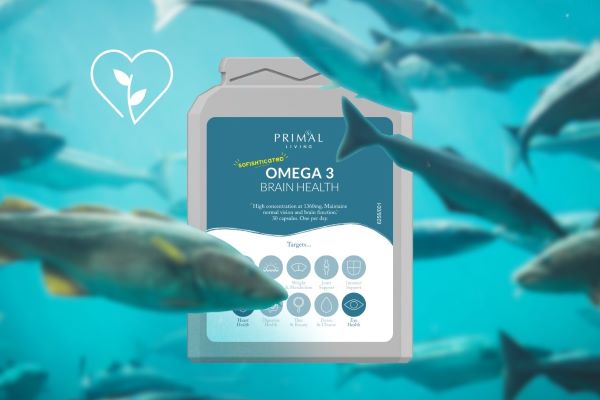Omega 3 not only helps keep your heart, lungs and joints healthy, but by doing so, it can also help improve the quality of your runs.
If you’ve been guilty of popping a paracetamol after a long run or for soaking far too long in the bath because your muscles ache and your joints feel like they’ve seen better days, perhaps it’s time to consider how much oily fish you’re really consuming.
What does omega 3 do?
Omega 3 fish oil contains EPA (eicosapentaenoic acid) and DHA (docosahexaenoic acid) which are both essential nutrients that your body needs for so many different reasons (including the above)!
DHA is particularly important to us human beings as this remarkable fatty acid is a primary structural component of the human brain… hence why they call omega 3 ‘food for the brain’.
For many years, oily fish has been considered as one of the best dietary sources of omega 3 fatty acids. New research has now concluded that supplementing your diet with a high dose of 6g a day of fish oil derived n-3 polyunsaturated fatty acids can help improve muscle recovery following stressful exercise, with further research linking omega 3 to the relief of joint pain associated with arthritis and exercise.
In the study mentioned above, researchers carried out a randomised placebo-controlled, double-blinded experimental design to examine whether the effect of different fish oil dosages impacted the recovery of muscular performance, soreness and the markers of muscle damage after a bout of stressful exercise.
The results of the study revealed that supplementation of 6g per day (2400mg a day of EPA and 1800mg a day of DHA) helped to optimise the recovery of both performance and muscle soreness. Great news for long distance runners, right?
Whether you run long distances or not though, our bodies are always producing inflammatory substances and with the support of omega 3, it can help enhance the creation of natural anti-inflammatory prostaglandin E3 which will help reduce the amount of tissue inflammation in the body.
Omega 3 helps support your heart health
Another important benefit of taking omega 3 is that it contributes to the normal function of the heart with the NHS also seeing some evidence to support this. This is based on taking 250mg EPA and DHA per day.
Dr Zoe Williams GP, recently alerted the public to “New scientific research has found a previously unreported link between omega-3 and blood pressure. The research also found links between omega-3 and a variety of heart health benefits including, blood pressure, chronic heart disease, triglycerides, atherosclerosis and arrhythmias.”
Are you getting enough omega 3?
Because the body cannot produce EPA and DHA by itself, it’s really important that we get this vital nutrition through our diet. Sadly though, many of us lack these two essential fatty acids due to high consumption of processed foods or poor diet choices.
The best ways to consume omega 3
Of course, eating fish in the simplest way to consume omega 3. After all, fish is the richest dietary source of DHA and EPA, especially salmon, herring, mackerel, swordfish and sardines.
Flaxseed, walnuts and canola oil also contain high levels of omega 3, but it’s important to consider that plant sources of omega 3 (ALA) are less effective than those found in fish itself. Why? Because the body must convert all ALA to DHA or EPA first and the body can only process 3-5% of the ALA you eat.
Although, it goes without saying that if you are vegetarian or vegan, plant-based omega 3 sources are still important to consume daily. However, we also understand that not everyone can consume enough omega 3 through dietary sources alone, which is when omega 3 supplements are the next best option.
Different omega 3 supplements can vary on quality, purity and concentration. The Primal Living Omega 3 Brain Health supplement is a high concentration formula, meaning you only need to take one capsule per day to get the same amount of EPA and DHA in other tablets. Their Omega 3 fish oil is also extracted from deep cold-water fish, to avoid fish harmed by our polluted oceans.






